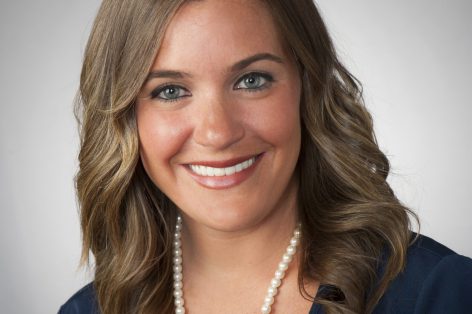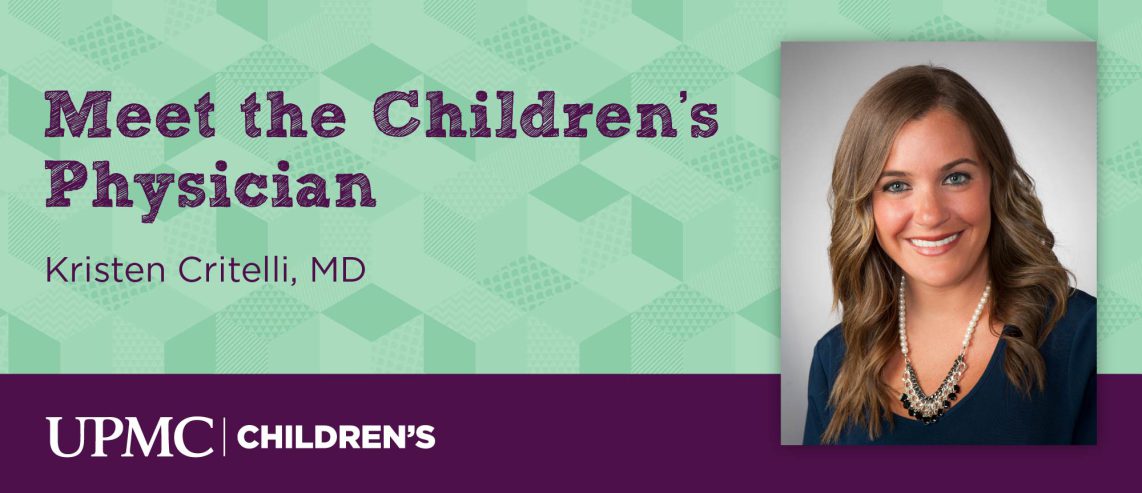Dr. Kristen Critelli, MD, is a pediatric gastroenterologist at UPMC Children’s Hospital of Pittsburgh with a profound dedication to quality, compassionate care.
Dr. Critelli joined UPMC Children’s Hospital in 2015 for a fellowship with the Pediatric Gastroenterology Division, where she won the T32 Postdoctoral Ruth L. Kirschstein National Research Service Award Institutional Research Training Grant.
She earned her medical degree at SUNY Upstate Medical University and completed her residency at Weill Cornell Medical College in New York City.
Now, Dr. Critelli wears many hats at UPMC.
Never Miss a Beat!
Subscribe to Our HealthBeat Newsletter!
Thank you for subscribing!
You can now select the specific newsletters you'd like to receive.
You are already subscribed.
Subscribe to more newsletters in our email preference center.
Sorry, an error occurred. Please try again later.
Get Healthy Tips Sent to Your Phone!
She’s an assistant professor of pediatrics at the University of Pittsburgh School of Medicine, teaching a digestion and nutrition course required for all second-year medical students. She’s also the assistant director of the Division of Pediatric Gastroenterology’s Gastrointestinal Procedures Suite and co-medical director of the newly created Center for Pediatric Eosinophilic Gastrointestinal Disorders.
Her clinical interests include the development of pediatric endoscopy clinical pathways, best-practice standards, and pediatric eosinophilic gastrointestinal disorders.

She’s a member of several professional societies, with research published in journals including the Journal of Clinical Gastroenterology and the Journal of Liver Transplantation.
In addition to our main hospital campus in Pittsburgh and telemedicine visits, Dr. Critelli sees patients at UPMC Children’s Specialty Care Centers in Wheeling, West Virginia, and Washington, Pa.
Dr. Critelli sat down to chat more about what motivates her as a medical professional, educator, and researcher.
Q: What initially motivated you to pursue pediatrics?
A: I initially became interested in pediatrics in high school. I was employed by an organization called Upstate Cerebral Palsy, which provided personal, developmental, and educational support for children and adults with disabilities.
I was able to work closely with teachers and therapists and, in doing so, helped to encourage the growth and independence of children with disabilities.
I found that the experience of helping children advance and develop life skills could be challenging, but certainly very, very rewarding. I was inspired by that job and wanted to continue my service to children as a pediatrician.
Q: Why gastroenterology, specifically?
A: I think it was a combination of different personal and professional experiences, but one personal experience, in particular, was as a young child, I began experiencing the sensation of having something stuck in my throat, which was terrifying. It resulted in my own refusal to eat solid foods.
My pediatrician noted a steady decline in my growth percentiles and referred me to a pediatric gastroenterologist. I was ultimately diagnosed with eosinophilic esophagitis, which is a type of allergic inflammatory disorder affecting the esophagus and is now one of the disorders I have an immense interest in.
This illness impacted me not only physically, but I think the emotional and psychological impacts were longer lasting. Even after appropriate medical treatment, the fear of choking and an inability to swallow continued to cause feeding refusal and this incessant insistence to ensure liquids were always readily accessible to me.
My pediatric gastroenterologist really worked to gain my confidence and create a trusting relationship so I could feel safe expressing my feelings and fears about the illness. In doing so, he attended to my medical and emotional needs, and I eventually overcame the struggles associated with it.
The quality of care that was displayed was an inspiration, and this personal encounter allows me to be more relatable to the patients I care for. I strive to provide that same quality of individualized health care to my patients.
Q: How have your personal experiences shaped your roles within UPMC Children’s?
A: I’ve now had this opportunity to create our Center for Pediatric Eosinophilic Gastrointestinal Diseases and work with infants, children, and teenagers living with these lifelong conditions, some of whom present with similar symptoms to my own.
It’s been really nice to see this multidisciplinary center develop. We work with a team of experts that not only include gastroenterologists, but also allergists, pathologists, dietitians, speech language pathologists, and psychologists to tailor our patients’ individual treatment plans.
Patients with these disorders may require multiple endoscopic procedures to reevaluate and treat their disease.
As an assistant director of our Gastrointestinal Procedures Suite, we perform a number of different procedures, including endoscopies and colonoscopies.
We do more advanced procedures, too. I work really closely with the other director on quality improvement initiatives in our endoscopy center to improve the experience and outcomes of the patients receiving these services.
I’m also doing research on available therapies for patients in our Center for Pediatric Eosinophilic Gastrointestinal Disorders in an effort to determine if there are certain factors that might suggest that a particular patient may be more responsive to one therapy over another.
Q: What’s the most rewarding part of being an educator?
A: I’ve become very passionate about mentoring and teaching the next generation of physicians.
For the past three years, I’ve had the privilege of serving as course director for a medical school course. I’ve worked to assess students learning and proactively modify the curriculum. I continue to collaborate with other faculty on future curriculum reforms to provide focused and innovative teaching strategies to enhance student engagement and improve their academic outcomes.
I think if we can bring wonderful people into this profession, it’s ultimately going to impact the quality of care we are able to provide for our patients.
Q: What are some of your hobbies and interests outside of your roles at UPMC?
A: I would say I love traveling with my husband and friends and being exposed to new surroundings, engaging with different people, gaining new perspectives, and gaining new experiences with loved ones.
I’ve traveled to Italy to meet new family. I’ve attended a music festival in Belgium. I’ve climbed Machu Picchu in Peru, and we’re headed to Greece in a couple of months.
Alongside that, I’ve developed a very adventurous appetite, so I’m always excited to try new restaurants, which I think is another thing that helps you appreciate the world around you. I recently tried Duo’s Taqueria in East Liberty, it’s a concept restaurant by Duolingo where you can eat fabulous Mexican food and learn and practice Spanish, so I highly recommend that.
And then lastly, I love practicing yoga. It’s very grounding for me, and it allows me to change my focus to the present moment.
To learn more about UPMC Children’s Division of Pediatric Gastroenterology, Hepatology, and Nutrition and meet the rest of our team, visit chp.edu/our-services/gastroenterology.
About UPMC
Headquartered in Pittsburgh, UPMC is a world-renowned health care provider and insurer. We operate 40 hospitals and 800 doctors’ offices and outpatient centers, with locations throughout Pennsylvania, Maryland, New York, West Virginia, and internationally. We employ 4,900 physicians, and we are leaders in clinical care, groundbreaking research, and treatment breakthroughs. U.S. News & World Report consistently ranks UPMC Presbyterian Shadyside as one of the nation’s best hospitals in many specialties and ranks UPMC Children’s Hospital of Pittsburgh on its Honor Roll of America’s Best Children’s Hospitals. We are dedicated to providing Life Changing Medicine to our communities.
